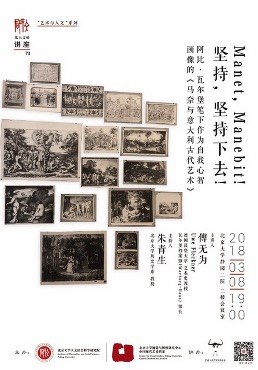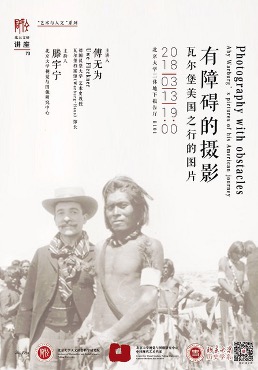Journal

Manet, Manebit! – Aby Warburg’s ‘Manet and Italian antiquity’ as a psycho-intellectual self-portrait
Public lecture by Prof. Uwe Fleckner, visiting professor of Peking University and director of the Warburg-Haus Hamburg, Peking University, March 8th 2018

Photography with obstacles – Aby Warburg’s pictures of his American journey
Public lecture by Prof. Uwe Fleckner, visiting professor of Peking University and director of the Warburg-Haus Hamburg, Peking University, March 13th 2018
Warburg in China
瓦尔堡在中国
Yuning Teng, deputy director of the Center for Visual Studies, Peking University
(撰稿:滕宇宁)
Cooperating with the Hamburg Warburg-Haus, the Department of History and the Center for Visual Studies of Peking University (PKU) organized a research project entitled “Aby Warburg and Iconography” in Beijing in March 2018. Uwe Fleckner, visiting professor of Peking University, was invited to host a workshop under the same title for PhD students and selected scholars from Peking University and other institutes of China. This is the first time that Warburg’s methodology was introduced into China systematically, an undertaking that will lead to a translation project conducted in collaboration of the Warburg-Haus and the Center for Visual Studies.
During the workshop, two public lectures at PKU were given by Prof. Fleckner. The first lecture on March 8th, entitled “Manet, Manebit! – Aby Warburg’s ‘Manet and Italian antiquity’ as a psycho-intellectual self-portrait”, analyzed Warburg’s iconological research on the relevance of antique prototypes for Manet’s painting and pointed out that Warburg’s preoccupation with the French artist’s works provides not only the historical model of changing receptions of pictures from antiquity to the present, but served as a kind of self-portrait with a therapeutic function in the existence of an art and cultural historian who during his lifetime wrestled with the demons of his own manic-depressive existence. The second lecture on March 13th entitled “Photography with obstacles – Aby Warburg’s pictures of his American journey” introduced a choice of photographs taken by Warburg during his trip to the United States in 1895-1896, which have been far less thoroughly researched than his posthumously published essay on “serpent ritual”, and indicated how these photographic materials gave a methodological and thematic boost to the art historian’s research, his anthropologization of art history, as well as his notion of the “space for reflection”.
The two lectures were co-sponsored by the Institute of Humanities and Social Sciences of PKU, Department of History of PKU, Center for Visual Studies of PKU, and Wu Zuoren International Foundation of Fine Arts. They were hosted by Lao Zhu (Zhu Qingsheng), Professor of Art History at PKU, and Yuning Teng, deputy director of the Center for Visual Studies. About two hundred students and scholars came to attend the lectures and a much larger audience followed the presentations via online video streaming.
北京大学历史系与北大视觉与图像研究中心,联合汉堡瓦尔堡研究院,于2018年三月在北京共同开展“阿比·瓦尔堡与图像学”研究项目。傅无为(Uwe Fleckner)教授受邀作为北大访问教授,主持了工作坊授课,课程主要面向北大博士生以及中国其他研究机构遴选的青年学者。这次活动可以看作是瓦尔堡的思想和方法第一次被系统地引入中国,同时也标志着汉堡瓦尔堡研究院与北京大学视觉与图像研究中心翻译合作项目的开展。
工作坊期间,傅无为教授还在北大进行了两场公开讲座。第一次讲座于3月8日举行,题为“Manet, Manebit!( 坚持,坚持下去!)——阿比·瓦尔堡笔下作为自我心智画像的《马奈与意大利古代艺术》”。该场讲座分析了瓦尔堡对意大利古代艺术原型与马奈绘画关联性的研究,并且提出,瓦尔堡专注于对这位法国艺术家的研究,不仅提供了一种从古至今不断变化的对图画接受的历史模式,并且,这也成为一幅心智方面的自画像,对瓦尔堡的个人经历起到疗治的作用——他一生中都在与自己躁狂-抑郁的生存状态进行斗争。第二场讲座于3月13日举办,题为“有障碍的摄影——瓦尔堡美国之行的图片”,选取瓦尔堡1895-1896年走访美国期间拍摄的富有代表性的照片进行分析,而这些摄影素材与其过世后被编纂发表的大名鼎鼎的《蛇仪》一文相比,还远远没有被仔细研究过。讲座进一步指出这些图片材料如何从方法论和主题方面大大促进了这位艺术史家的研究、人类学视野下的艺术史思考,及其提出的“反思的空间”的概念。
两次讲座由北京大学人文社会科学研究院、北京大学历史学系艺术史研究室、北京大学视觉与图像研究中心、吴作人国际美术基金会联合主办;由北京大学艺术史教授朱青生、北京大学视觉与图像研究中心副主任滕宇宁主持。大约有两百听众到场聆听,同时有更多的观众通过网络直播收看了这两场讲座。